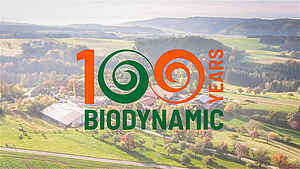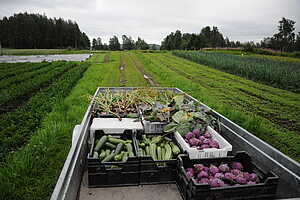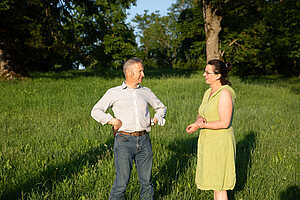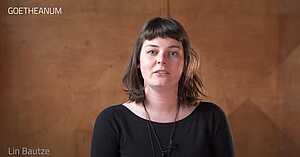Living Farms Videos
Potential of Biodynamic Places to Grow beyond Global Change
As part of the project "Living Farms: Potential of Biodynamic Places to Grow beyond Global Change", visits were made to study biodynamic farms throughout the world. The thoughts, strategies and options for action of the very varied biodynamic farms in times of global change will be made visible and accessible through short videos, publications and events. This will enable those in practical agriculture and advisory services as well as consumers to access the repertoire of possibilities of biodynamic farming sites. This access will enable a united growth towards the challenges of global change.
We live in a time of global change. Our environment, our social interactions and our understanding of economics are undergoing constant change. The agricultural sector is also facing a series of pressing changes. Climate change, the loss of soil quality and quantity, loss of biodiversity and the pollution of water resources pose new and urgent challenges for agricultural practice. The question of how to live a healthy life becomes ever more crucial. This includes a healthy diet from healthy food grown on healthy soils. By eating these foods, we encounter their unique quality, developed on their local farm, in its particular landscape. By choosing this food, we say “yes” to this type of production. We make a decision about the nature of our environment. This means that the farm and the consumer are interrelated. These relationships can be as diverse as the farms themselves. You could call this a food laboratory, a unity that expresses the interactions of the people involved and their surroundings.
In addition, new economic models such as associative economics raise hopes for a sustainable future for the agriculture sector.
Nevertheless, the negative effects of global change force farmers to react quickly in order to avoid a loss of production and profitability. This demands a new view of our agricultural production system and our behavior as consumers. We need innovative concepts in order to master the balancing act of a sustainable agriculture for human beings and the environment. These concepts must be tried and tested, easy to implement and quick to learn and experience for the different farms worldwide.
Many biodynamic farms have been founded and developed based on the inspiring concepts of the “farm organism” and the “agricultural individuality”. Today, we recognize that these farms can be motivating examples that can cope with and build resilience under global change. The improvement of soil fertility and animal welfare, innovative practices in plant breeding, the connection of value chains, lively food workshops around a farm and further ideas have come about through biodynamics and are already being put into practice. These can be a stimulus for the future in view of challenges such as climate change and problems such as food waste. The project “Living Farms: Potential of Biodynamic Places to Grow beyond Global Change” will visit and study some of these farms to create short videos which can provide encouraging examples wherever needed: in the field, in the stores, in kitchens and in offices.
Global change brings new opportunities to connect quickly with one another. New media help to inspire, learn from one another, exchange and grow together. It has never been as easy as it is at the present day. Networking offers the potential for open, inquisitive, participatory dialogue to explore the opportunities and challenges of agriculture in our time.
Alois Lageder wine in South Tyrol
The family business Alois Lageder started with a small wine shop in Bolzano and two nearby vineyards. Alois Lageder took over responsibility for the…
Community Supported Agriculture Rekola in Finland
Rekola Farm in Finland lies in a gentle landscape of forests and lakes. The family has been working this land since 1619 and has been able to develop…
Family Farm Martinelis in Lithuania
The Martinelis biodynamic family farm near Vilnius in Lithuania lies amidst lush green countryside. Despite the growing numbers of biodynamic farms,…
Video: All mumbo-jumbo or solution to current problems?
Biodynamic agriculture put to the test - with Ueli Hurter and Lin Bautze
More than meets the eye: ‘Living Farms’ – farming cooperative ‘Limbua Group’ in Kenya
The Limbua Macadamia Group started off as a pioneer in establishing small-scale farming cooperatives. In the video series ‘Living Farms’, Lin Bautze…
Limbua Group in the Mount Kenya Region
The Limbua Initiative covers the Mount Kenya region where 5,000 small farmers produce valuable macadamia nuts under one umbrella organisation. Since…
Lin Bautze: Living Farms - Learning from each other worldwide
In the Living Farms project, Lin Bautze and Philip Wilson visit farms around the world to document their lives and opportunities for action and then…
Project-Update Living Farms
The aim of the Living Farms project is to make knowledge accessible for healthy, sustainable change, thus providing inspiration and opportunities for…
Garden Park at the Goetheanum
Benno Otter and his team have created an exceptional park on a total of 12 hectares of land around the School of Spiritual Sciences in Switzerland.…











